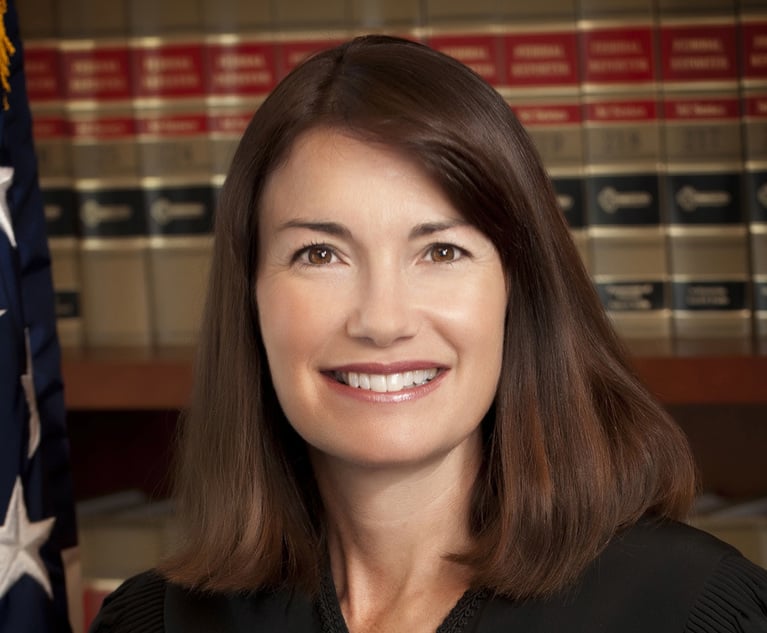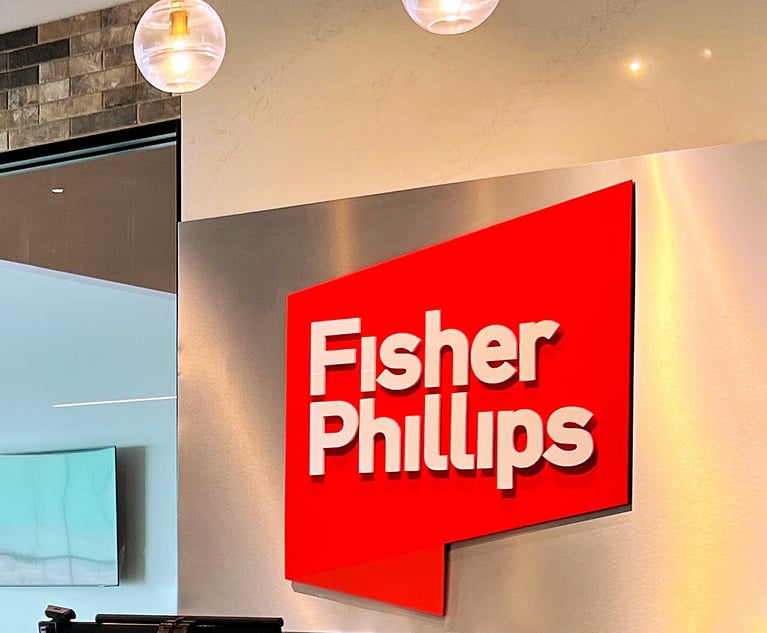New Study Finds Associates Like Their Partners, but Not Vice Versa
A survey of nearly 1,400 partners and more than 1,000 associates at regional, national and elite law firms reveals that most partners don't think that their associates work as hard as they did at that stage of their careers, and many partners think today's associates are not as good at their jobs and are less committed to their work.
April 02, 2020 at 01:00 AM
5 minute read
The original version of this story was published on Law.com
 Aric Press, left, and James Leipold, right.
Aric Press, left, and James Leipold, right.
Today's law firm associates have generally positive things to say about the partners they work for. Unfortunately, that admiration isn't reciprocal.
A new, large-scale survey reveals that most partners don't think that their associates work as hard as they did at that stage of their careers, and many partners think today's associates are not as good at their jobs and are less committed to their work.
The report, titled "Multiple Generations In Law Firms: Working Together," is a collaboration between the National Association for Law Placement (NALP) and law firm consulting firm PP&C. Researchers gathered survey responses from nearly 1,400 partners and more than 1,000 associates at regional, national and elite law firms in 2019 in a bid to better understand the generational dynamics at play in those workplaces.
Among the major findings is that law firm partners have remarkably similar views about their work, whether they are baby boomers soon to retire or millennials who have only recently joined the partnership ranks. Millennial partners are more likely to work from home, and they tend to have somewhat higher opinions of associates than their older colleagues. But partners across generations are remarkably similar when it comes to being committed to and satisfied with their work.
"The oldest members of the millennial generation have become partners at major U.S. law firms," the report reads. "It turns out that these new partners share most of the attitudes and habits of the partners they are replacing or joining."
The report also offers an in-depth look at how associates feel about their jobs and their career aspirations. In general, they like the partners at their firm. Only 9% of the associate respondents listed partners when asked what they dislike about their firms, and 45% listed partners among the top four responses when asked what they most like.
Yet a large percentage of associates don't aspire to join the partner ranks. Fully 59% of the respondents said they don't want to become partners at their current firm, while 41% said they do. First-year associates were the least likely to report wanting to be partner, and that percentage steadily increased through the ranks of senior associates.
"I suspected that it was a minority of associates who were in for the long run and were prepared to make the sacrifices, work hard, and love it enough to compete for partnership," said Aric Press, a partner at PP&C and co-author of the report. "But I was surprised that is was 59% saying, 'No, I don't aspire to that.' And the numbers were particularly low in New York and at the economic elite firms. Which, when I thought about it, was probably not that surprising given that those are the most intense places." (Press is former editor-in-chief of Law.com affiliate The American Lawyer.)
The report suggests that law firms find opportunities to retain those associates who don't want to pursue the partnership track.
"This may be an opportune moment to seriously consider structures that allow firms to focus more development effort on those interested in partnership, while providing alternative career paths within the firm for talented, valuable lawyers who don't wish for the partnership life," the report reads.
A smaller percentage of women than men said they want to be partner—they comprised 46% of that group. Latinx associates also reported a higher percentage of partner aspirations than any other group, followed by black associates, at 60% and 46%, respectively, compared to 42% among white associates.
"The most surprising finding to me, and certainly among the most important findings, is the finding that black and Latinx associates are more likely than white associates to aspire to become partners at their current firms," said NALP executive director James Leipold.
The report also looked at how happy—or not—lawyers of different generations and at different stages in their career report to be. Baby boomers reported the highest levels of happiness among partners, while Generation X partners reported the lowest. That result may well come from the fact that baby boomers are nearing retirement, while many of the nuts and bolts of running a firm now fall on Gen Xers, the report notes. Overall, associates were the least happy group, with women associates reporting the lowest happiness rates.
The report also highlights some interesting findings on how partners view associates. Just 56% of the surveyed partners said today's associates are as good as they are, and that figure was just 29% among Gen X partners. Among all partners, 40% said associates expect too much of their law firms, and 37% said associates put their own needs and interests ahead of their firm and clients.
"To review, a substantial percentage of partners appear to be disappointed in their associates," the report reads. "A majority don't think today's young lawyers work as hard as they did. A substantial minority think young lawyers are not as skilled as they were. And about a third find their associates selfish."
This content has been archived. It is available through our partners, LexisNexis® and Bloomberg Law.
To view this content, please continue to their sites.
Not a Lexis Subscriber?
Subscribe Now
Not a Bloomberg Law Subscriber?
Subscribe Now
NOT FOR REPRINT
© 2024 ALM Global, LLC, All Rights Reserved. Request academic re-use from www.copyright.com. All other uses, submit a request to [email protected]. For more information visit Asset & Logo Licensing.
You Might Like
View All

Judge Asks: Should Tom Girardi Serve Sentence in a Medical Facility or Behind Bars?
4 minute read
Trending Stories
- 1Advising 'Capital-Intensive Spaces' Fuels Corporate Practice Growth For Haynes and Boone
- 2Big Law’s Year—as Told in Commentaries
- 3Pa. Hospital Agrees to $16M Settlement Following High Schooler's Improper Discharge
- 4Connecticut Movers: Year-End Promotions, Hires and an Office Opening
- 5Luigi Mangione Defense Attorney Says NYC Mayor’s Comments on Case Raise Fair Trial Concerns
Who Got The Work
Michael G. Bongiorno, Andrew Scott Dulberg and Elizabeth E. Driscoll from Wilmer Cutler Pickering Hale and Dorr have stepped in to represent Symbotic Inc., an A.I.-enabled technology platform that focuses on increasing supply chain efficiency, and other defendants in a pending shareholder derivative lawsuit. The case, filed Oct. 2 in Massachusetts District Court by the Brown Law Firm on behalf of Stephen Austen, accuses certain officers and directors of misleading investors in regard to Symbotic's potential for margin growth by failing to disclose that the company was not equipped to timely deploy its systems or manage expenses through project delays. The case, assigned to U.S. District Judge Nathaniel M. Gorton, is 1:24-cv-12522, Austen v. Cohen et al.
Who Got The Work
Edmund Polubinski and Marie Killmond of Davis Polk & Wardwell have entered appearances for data platform software development company MongoDB and other defendants in a pending shareholder derivative lawsuit. The action, filed Oct. 7 in New York Southern District Court by the Brown Law Firm, accuses the company's directors and/or officers of falsely expressing confidence in the company’s restructuring of its sales incentive plan and downplaying the severity of decreases in its upfront commitments. The case is 1:24-cv-07594, Roy v. Ittycheria et al.
Who Got The Work
Amy O. Bruchs and Kurt F. Ellison of Michael Best & Friedrich have entered appearances for Epic Systems Corp. in a pending employment discrimination lawsuit. The suit was filed Sept. 7 in Wisconsin Western District Court by Levine Eisberner LLC and Siri & Glimstad on behalf of a project manager who claims that he was wrongfully terminated after applying for a religious exemption to the defendant's COVID-19 vaccine mandate. The case, assigned to U.S. Magistrate Judge Anita Marie Boor, is 3:24-cv-00630, Secker, Nathan v. Epic Systems Corporation.
Who Got The Work
David X. Sullivan, Thomas J. Finn and Gregory A. Hall from McCarter & English have entered appearances for Sunrun Installation Services in a pending civil rights lawsuit. The complaint was filed Sept. 4 in Connecticut District Court by attorney Robert M. Berke on behalf of former employee George Edward Steins, who was arrested and charged with employing an unregistered home improvement salesperson. The complaint alleges that had Sunrun informed the Connecticut Department of Consumer Protection that the plaintiff's employment had ended in 2017 and that he no longer held Sunrun's home improvement contractor license, he would not have been hit with charges, which were dismissed in May 2024. The case, assigned to U.S. District Judge Jeffrey A. Meyer, is 3:24-cv-01423, Steins v. Sunrun, Inc. et al.
Who Got The Work
Greenberg Traurig shareholder Joshua L. Raskin has entered an appearance for boohoo.com UK Ltd. in a pending patent infringement lawsuit. The suit, filed Sept. 3 in Texas Eastern District Court by Rozier Hardt McDonough on behalf of Alto Dynamics, asserts five patents related to an online shopping platform. The case, assigned to U.S. District Judge Rodney Gilstrap, is 2:24-cv-00719, Alto Dynamics, LLC v. boohoo.com UK Limited.
Featured Firms
Law Offices of Gary Martin Hays & Associates, P.C.
(470) 294-1674
Law Offices of Mark E. Salomone
(857) 444-6468
Smith & Hassler
(713) 739-1250







